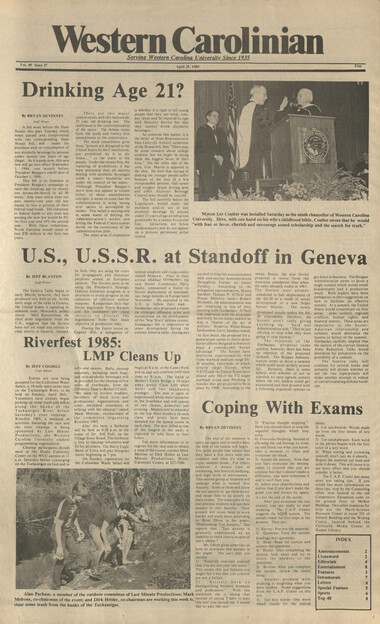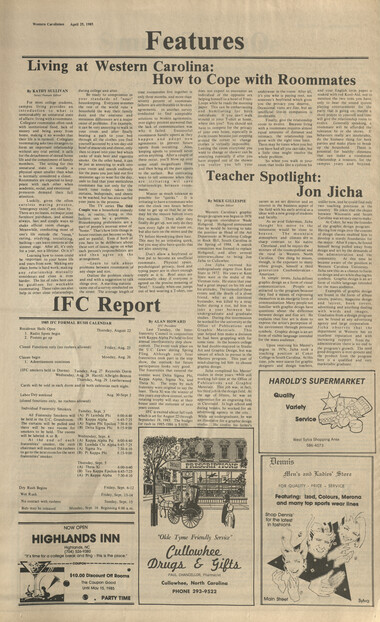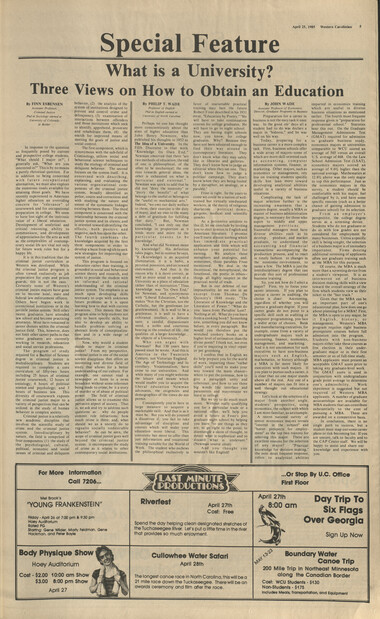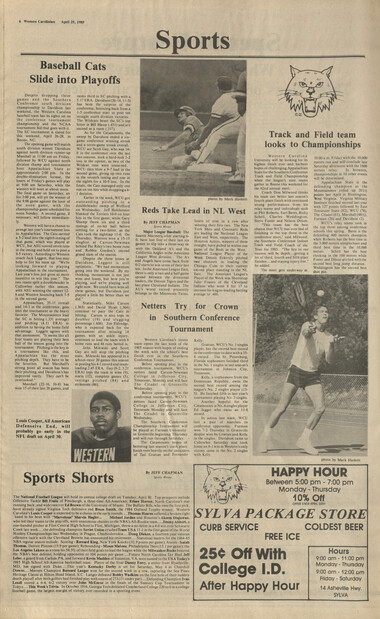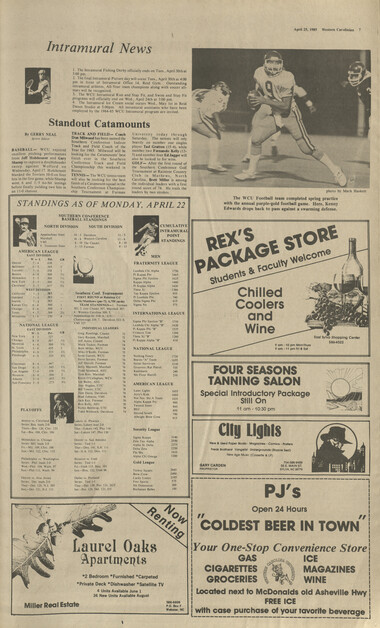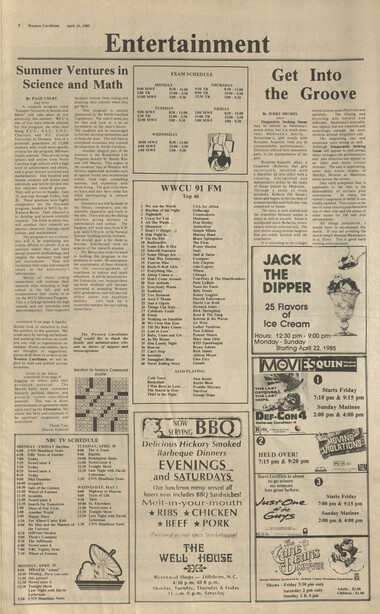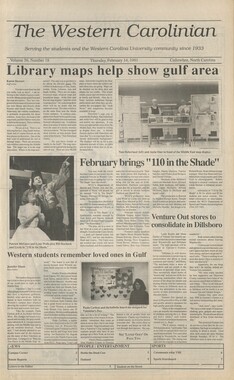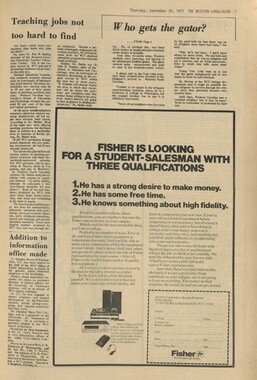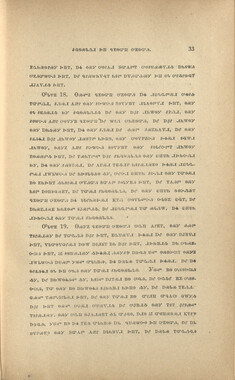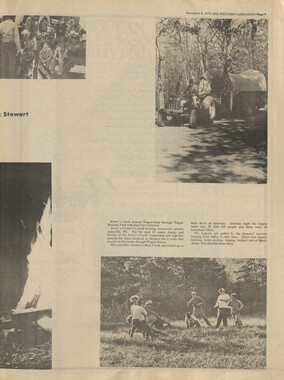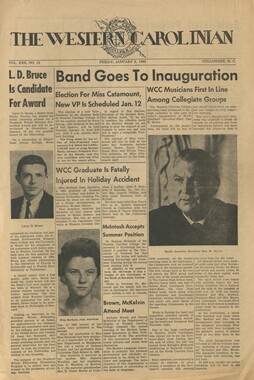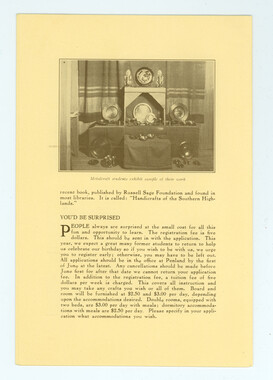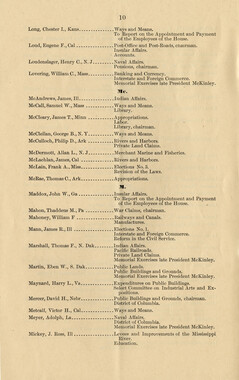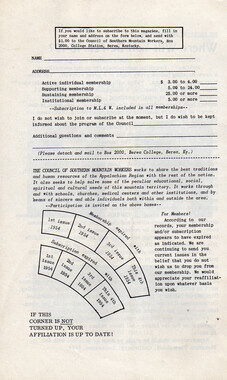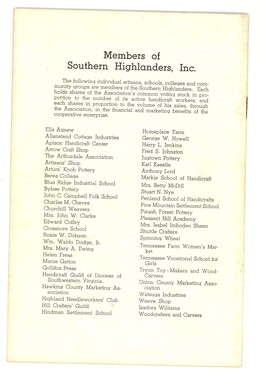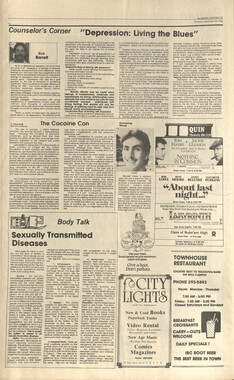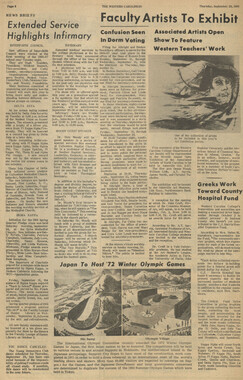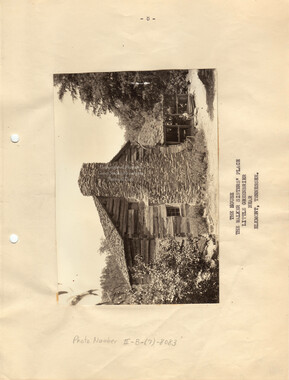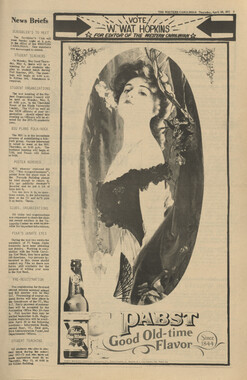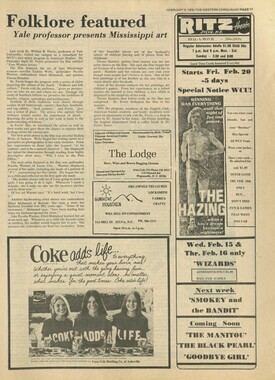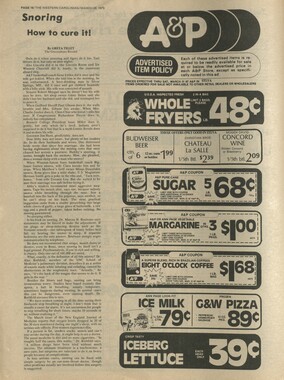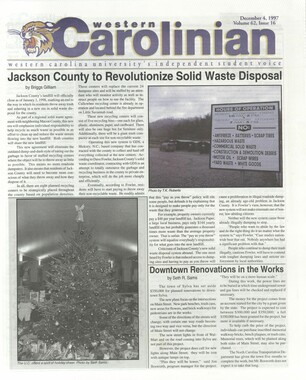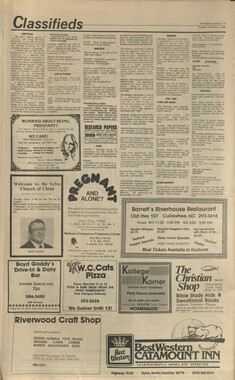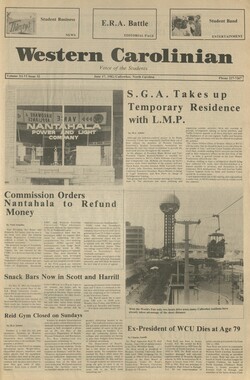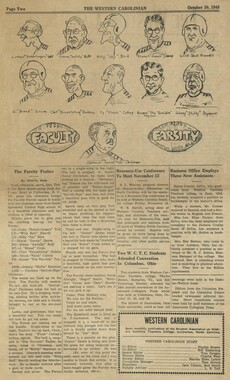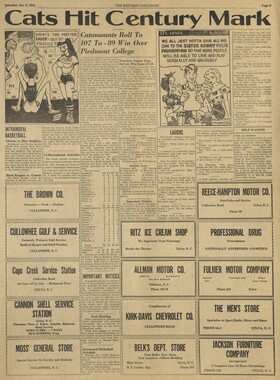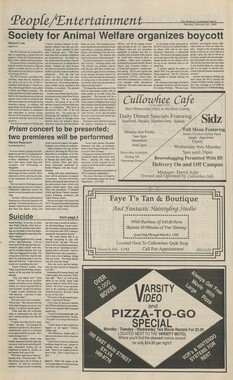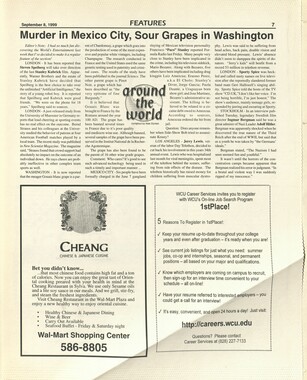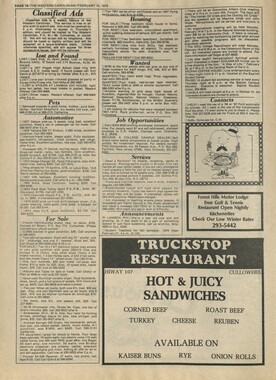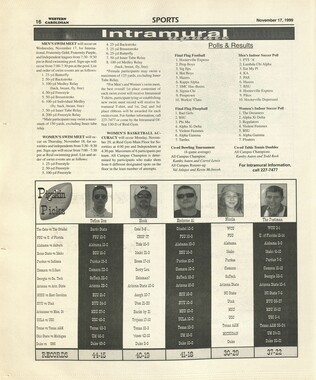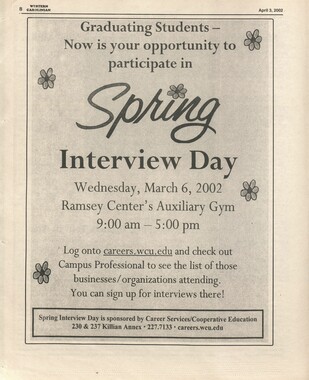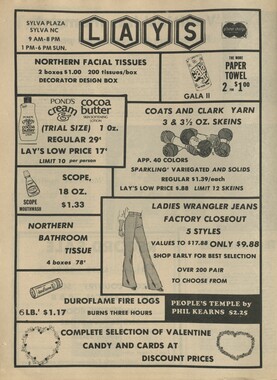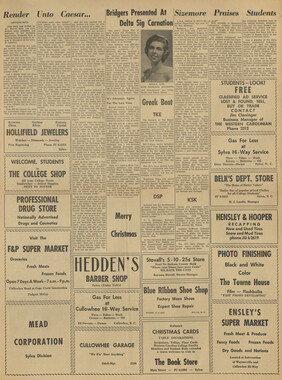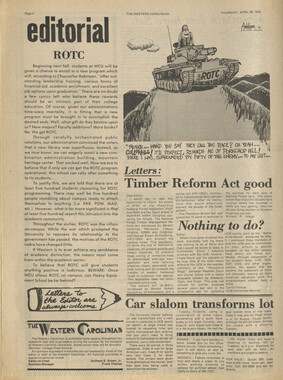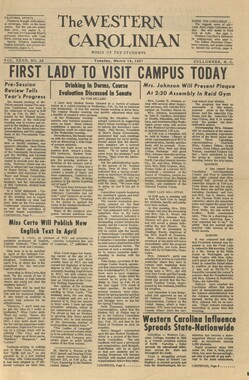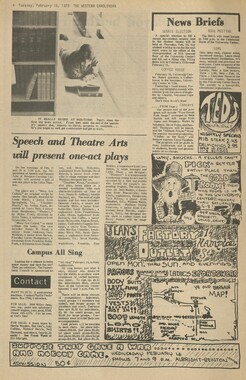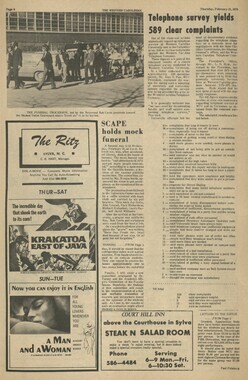Western Carolina University (20)
View all
- Canton Champion Fibre Company (2308)
- Cherokee Traditions (293)
- Civil War in Southern Appalachia (165)
- Craft Revival (1942)
- Great Smoky Mountains - A Park for America (2683)
- Highlights from Western Carolina University (430)
- Horace Kephart (941)
- Journeys Through Jackson (154)
- LGBTQIA+ Archive of Jackson County (15)
- Oral Histories of Western North Carolina (314)
- Picturing Appalachia (6679)
- Stories of Mountain Folk (413)
- Travel Western North Carolina (160)
- Western Carolina University Fine Art Museum Vitreograph Collection (129)
- Western Carolina University Herbarium (92)
- Western Carolina University: Making Memories (708)
- Western Carolina University Publications (2283)
- Western Carolina University Restricted Electronic Theses and Dissertations (146)
- Western North Carolina Regional Maps (71)
- World War II in Southern Appalachia (131)
University of North Carolina Asheville (6)
View all
- Allanstand Cottage Industries (62)
- Appalachian National Park Association (53)
- Bennett, Kelly, 1890-1974 (1295)
- Berry, Walter (76)
- Brasstown Carvers (40)
- Carver, George Washington, 1864?-1943 (26)
- Cathey, Joseph, 1803-1874 (1)
- Champion Fibre Company (233)
- Champion Paper and Fibre Company (297)
- Cherokee Indian Fair Association (16)
- Cherokee Language Program (22)
- Crowe, Amanda (40)
- Edmonston, Thomas Benton, 1842-1907 (7)
- Ensley, A. L. (Abraham Lincoln), 1865-1948 (275)
- Fromer, Irving Rhodes, 1913-1994 (70)
- George Butz (BFS 1907) (46)
- Goodrich, Frances Louisa (120)
- Grant, George Alexander, 1891-1964 (96)
- Heard, Marian Gladys (60)
- Kephart, Calvin, 1883-1969 (15)
- Kephart, Horace, 1862-1931 (313)
- Kephart, Laura, 1862-1954 (39)
- Laney, Gideon Thomas, 1889-1976 (439)
- Masa, George, 1881-1933 (61)
- McElhinney, William Julian, 1896-1953 (44)
- Niggli, Josephina, 1910-1983 (10)
- North Carolina Park Commission (105)
- Osborne, Kezia Stradley (9)
- Owens, Samuel Robert, 1918-1995 (11)
- Penland Weavers and Potters (36)
- Roberts, Vivienne (15)
- Roth, Albert, 1890-1974 (142)
- Schenck, Carl Alwin, 1868-1955 (1)
- Sherrill's Photography Studio (2565)
- Southern Highland Handicraft Guild (127)
- Southern Highlanders, Inc. (71)
- Stalcup, Jesse Bryson (46)
- Stearns, I. K. (213)
- Thompson, James Edward, 1880-1976 (226)
- United States. Indian Arts and Crafts Board (130)
- USFS (683)
- Vance, Zebulon Baird, 1830-1894 (1)
- Weaver, Zebulon, 1872-1948 (58)
- Western Carolina College (230)
- Western Carolina Teachers College (282)
- Western Carolina University (1794)
- Western Carolina University. Mountain Heritage Center (18)
- Whitman, Walt, 1819-1892 (10)
- Wilburn, Hiram Coleman, 1880-1967 (73)
- Williams, Isadora (3)
- Cain, Doreyl Ammons (0)
- Crittenden, Lorraine (0)
- Rhodes, Judy (0)
- Smith, Edward Clark (0)
- Appalachian Region, Southern (2393)
- Asheville (N.C.) (1886)
- Avery County (N.C.) (26)
- Blount County (Tenn.) (147)
- Buncombe County (N.C.) (1664)
- Cherokee County (N.C.) (283)
- Clay County (N.C.) (555)
- Graham County (N.C.) (233)
- Great Smoky Mountains National Park (N.C. and Tenn.) (478)
- Haywood County (N.C.) (3522)
- Henderson County (N.C.) (70)
- Jackson County (N.C.) (4692)
- Knox County (Tenn.) (21)
- Knoxville (Tenn.) (9)
- Lake Santeetlah (N.C.) (10)
- Macon County (N.C.) (420)
- Madison County (N.C.) (211)
- McDowell County (N.C.) (39)
- Mitchell County (N.C.) (132)
- Polk County (N.C.) (35)
- Qualla Boundary (981)
- Rutherford County (N.C.) (76)
- Swain County (N.C.) (2017)
- Transylvania County (N.C.) (247)
- Watauga County (N.C.) (12)
- Waynesville (N.C.) (68)
- Yancey County (N.C.) (72)
- Aerial Photographs (3)
- Aerial Views (60)
- Albums (books) (4)
- Articles (1)
- Artifacts (object Genre) (228)
- Biography (general Genre) (2)
- Cards (information Artifacts) (38)
- Clippings (information Artifacts) (191)
- Crafts (art Genres) (622)
- Depictions (visual Works) (21)
- Design Drawings (1)
- Drawings (visual Works) (184)
- Envelopes (73)
- Facsimiles (reproductions) (1)
- Fiction (general Genre) (4)
- Financial Records (12)
- Fliers (printed Matter) (67)
- Glass Plate Negatives (381)
- Guidebooks (2)
- Internegatives (10)
- Interviews (811)
- Land Surveys (102)
- Letters (correspondence) (1013)
- Manuscripts (documents) (619)
- Maps (documents) (159)
- Memorandums (25)
- Minutes (administrative Records) (59)
- Negatives (photographs) (5651)
- Newsletters (1285)
- Newspapers (2)
- Occupation Currency (1)
- Paintings (visual Works) (1)
- Pen And Ink Drawings (1)
- Periodicals (193)
- Personal Narratives (7)
- Photographs (12982)
- Plans (maps) (1)
- Poetry (5)
- Portraits (1655)
- Postcards (329)
- Programs (documents) (151)
- Publications (documents) (2237)
- Questionnaires (65)
- Scrapbooks (282)
- Sheet Music (1)
- Slides (photographs) (402)
- Sound Recordings (796)
- Specimens (92)
- Speeches (documents) (15)
- Tintypes (photographs) (8)
- Transcripts (322)
- Video Recordings (physical Artifacts) (23)
- Vitreographs (129)
- Text Messages (0)
- A.L. Ensley Collection (275)
- Appalachian Industrial School Records (7)
- Appalachian National Park Association Records (336)
- Axley-Meroney Collection (2)
- Bayard Wootten Photograph Collection (20)
- Bethel Rural Community Organization Collection (7)
- Blumer Collection (5)
- C.W. Slagle Collection (20)
- Canton Area Historical Museum (2110)
- Carlos C. Campbell Collection (198)
- Cataloochee History Project (65)
- Cherokee Studies Collection (4)
- Daisy Dame Photograph Album (5)
- Daniel Boone VI Collection (1)
- Doris Ulmann Photograph Collection (112)
- Elizabeth H. Lasley Collection (1)
- Elizabeth Woolworth Szold Fleharty Collection (4)
- Frank Fry Collection (95)
- George Masa Collection (173)
- Gideon Laney Collection (452)
- Hazel Scarborough Collection (2)
- Hiram C. Wilburn Papers (28)
- Historic Photographs Collection (236)
- Horace Kephart Collection (861)
- Humbard Collection (33)
- Hunter and Weaver Families Collection (1)
- I. D. Blumenthal Collection (4)
- Isadora Williams Collection (4)
- Jesse Bryson Stalcup Collection (47)
- Jim Thompson Collection (224)
- John B. Battle Collection (7)
- John C. Campbell Folk School Records (80)
- John Parris Collection (6)
- Judaculla Rock project (2)
- Kelly Bennett Collection (1314)
- Love Family Papers (11)
- Major Wiley Parris Civil War Letters (3)
- Map Collection (12)
- McFee-Misemer Civil War Letters (34)
- Mountain Heritage Center Collection (4)
- Norburn - Robertson - Thomson Families Collection (44)
- Pauline Hood Collection (7)
- Pre-Guild Collection (2)
- Qualla Arts and Crafts Mutual Collection (12)
- R.A. Romanes Collection (681)
- Rosser H. Taylor Collection (1)
- Samuel Robert Owens Collection (94)
- Sara Madison Collection (144)
- Sherrill Studio Photo Collection (2558)
- Smoky Mountains Hiking Club Collection (616)
- Stories of Mountain Folk - Radio Programs (374)
- The Reporter, Western Carolina University (510)
- Venoy and Elizabeth Reed Collection (16)
- WCU Gender and Sexuality Oral History Project (32)
- WCU Mountain Heritage Center Oral Histories (25)
- WCU Oral History Collection - Mountain People, Mountain Lives (71)
- WCU Students Newspapers Collection (1744)
- Western North Carolina Tomorrow Black Oral History Project (69)
- William Williams Stringfield Collection (2)
- Zebulon Weaver Collection (109)
- African Americans (388)
- Appalachian Trail (32)
- Artisans (521)
- Cherokee art (84)
- Cherokee artists -- North Carolina (10)
- Cherokee language (21)
- Cherokee pottery (101)
- Cherokee women (208)
- Church buildings (166)
- Civilian Conservation Corps (U.S.) (110)
- College student newspapers and periodicals (1830)
- Dams (94)
- Dance (1023)
- Education (222)
- Floods (60)
- Folk music (1015)
- Forced removal, 1813-1903 (2)
- Forest conservation (220)
- Forests and forestry (917)
- Gender nonconformity (4)
- Great Smoky Mountains National Park (N.C. and Tenn.) (154)
- Hunting (38)
- Landscape photography (10)
- Logging (103)
- Maps (84)
- Mines and mineral resources (8)
- North Carolina -- Maps (18)
- Paper industry (38)
- Postcards (255)
- Pottery (135)
- Railroad trains (69)
- Rural electrification -- North Carolina, Western (3)
- School integration -- Southern States (2)
- Segregation -- North Carolina, Western (5)
- Slavery (5)
- Sports (452)
- Storytelling (245)
- Waterfalls -- Great Smoky Mountains (N.C. and Tenn.) (66)
- Weaving -- Appalachian Region, Southern (280)
- Wood-carving -- Appalachian Region, Southern (328)
- World War, 1939-1945 (173)
Western Carolinian Volume 49 Number 27
Item
Item’s are ‘child’ level descriptions to ‘parent’ objects, (e.g. one page of a whole book).
-
-
Western Carolinian Servine Western Carolina University Since 1935 Vol. 49 Issue 27 April 25, 1985 Free Drinking Age 21? By BRYAN DEVINNEY Staff Writer A bill went before the State Senate this past Tuesday which, when passed and comprimised with the corresponding State House bill, will make the purchase and/or consumption of any alcoholic beverage by persons under twenty-one years of age illegal. As it stands now, this new law will go into effect September 1, 1986, one month before President Reagan's cutoff date of October 1, 1986. This bill is in response to President Reagan's campaign to raise the drinking age to twenty one across-the-board in all 50 states. Any state which does not pass twenty-one year old law stands to lose a portion of their federal road funds. The reduction in federal funds to any state not passing the new law would be 5% the first year and 10% the second year. With these reductions. North Carolina would stand to lose $30 million in the first two years. There are two major controversies with this nationwide 21 year old drinking law. The main issue is the constitutionality of the move. The debate stems from the tenth and twenty-first amendments to the constitution. The tenth amendment gives those "powers not delegated to the United States by the Constitution, nor prohibited by it to the States,..." to the states or the people. Under the twenty first, the repealing of prohibition, it has been presumed that all matters dealing with alcoholic beverages inside a state's boundries are under the control of the states. Although President Reagan's move does not appear to violate either of these amendments outright, it seems to some that the administration is using 'strong arm' tactics to accomplish its wishes. This belief is causing talk in some states of defying the administration's wishes and letting the Federal Courts system decide on the correctness of the administrations plan. The other area of contention is whether it is right to tell young people that they can work, vote, pay taxes and be required to sign with Selective Service but that they cannot drink alcoholic beverages. As concerns this matter, it is the belief of State Representative Dan Lilley (D.-Lenoir), submittor of the House bill, that, "There may be some concern about college students but we might be doing them the biggest favor of their lives." On the other side of the coin, Gov. Martin is opposed to the idea. He feels that instead of making the younger people suffer because of the acts of a few irresponsible persons, that newer and tougher drunk driving laws and ether Alcoholic Beverage Control laws should be enacted. The bill currently before the Legislature would make the purchase and/or use of any alcoholic beverage by anyone under 21 years of age an infraction punishable by a twenty five dollar fine. Infractions are below misdemeanors and do not appear on a persons permenant police record. Myron Lee Coulter was installed Saturday as the ninth chancellor of Western Carolina University. Here, with one hand on his wife's childhood bible, Coulter swore that he would "with fear or favor, cherish and encourage sound scholarship and the search for truth." U.S., U.S.S.R. at Standoff in Geneva By JEFF BLANTON Staff Writer The Geneva Talks began in early March; however, they have produced very little as yet. In this early stage of the talks in Geneva, the United States is signaling its concern over Moscow's public stance. Max Kampelman, the chief arms negotiator from the U.S., suggests that the Soviets have not yet made any serious or clear moves in Geneva. Instead, he feels, they are using the event for propaganda and rhetorical purposes aimed at European opinion. The Soviets seem to be using the President's Strategic Defense Initiation program as a diversion to avoid progress in the reduction of offensive nuclear weapons. Kampelman feels that Soviet negotiator Victor Karpon and his assistants are using rhetoric to distract the negotiations from their main objective of productive talks. During the Easter recess on Capitol Hill, a delegation of several senators and congressmen visited Moscow. Prior to their arrival Mikhail Gorbachev, the new Soviet Communist Party leader, announced a freeze on Soviet deployment of intermediate range missiles in Europe until November. He appealed to the U.S. to follow their lead. Gorbachev also proposed a freeze on strategic offensive arms and moratorium on the development of the "Star Wars" defense system. Gorbachev felt it imperative to cease development during the current Geneva talks. Gorbachev Riverfest 1985: LMP Cleans Up By JEFF COGHILL Copy Editor Entries are now being accepted for the Cullowhee Water Safari, a 19-mile open canoe race on the Tuckaseigee River, to be held on Sunday, April 28th. Volunteers have already begun picking up some trash and debris along the banks of the Tuckaseigee River before Saturday's river cleanup. Riverfest 1985, a weekend of activities featuring the race and the river cleanup, is being sponsored by Last Minute Productions, the Western Carolina University student programming organization. Cleanup participants should meet at the Hinds University Center on the WCU campus at 11 a.m. Saturday before converging on the Tuckaseigee on foot and in rafts and canoes. Rafts, cleanup materials, including trash bags, and non-alcoholic beverages will be provided for the cleanup of five miles of riverbanks, from the Dillsboro Dam to Barker's Creek. "We want to involve students, members of local civic and professional organizations and other interested volunteers in helping with the cleanup," stated Mark Melrose, co-chairman of the committee organizing Riverfest 1985. After the race, a barbecue will be held at 6:30 p.m. at the home of Dr. Jeff Neff, on the Village Store Road. The barbecue is free to cleanup volunteers and $4 for all others. The Harry Cagle Band of Sylva will play bluegrass music beginning at 7 pm. On Sunday, registration for the Cullowhee Water Safari will begin at 8 a.m. at the Caney Fork put-in and will continue until race time at 9 a.m. The finish at Barker's Creek Bridge is 19 miles away across Class I-III white water and two mandatory portages. The race is open to experienced white-water canoeists in the Southeast and will consist of two classes, downriver and cruising. Medals will be awarded to the top three finishers in each class, and prizes have been donated for the fastest canoe in each class. The race, billed as one Of the longest in the state, is expected to take three to four hours. For more information or to register for the race and to obtain a map of the course, contact Mark Melrose or Dirk Helder at Last Minute Productions, Hinds University Center, at 227-7206. seemed to time his announcement with anti-nuclear demonstrations throughout Europe on Easter Sunday. According to the delegation representatives, House Speaker Thomas P. O'Neill and House Minority leader Robert Micheals, the announcement was not surprising in lieu of their meeting with Gorbachev. O'Neill was impressed with the articulate and lively Soviet leader and felt he was a "master of the art of politics." However, White House Spokesman Larry Speakes stated, "At first blush, the proposal for a moratorium seems to revive prior Soviet efforts designed to freeze in place a considerable Soviet advantage." The Soviets have deployed approximately 414 triple-warhead medium range SS- 20 missiles, two-thirds of which directly target Europe, while NATO and the United States have placed only 104 of the 572 single warhead cruise and Pershing II missiles that are projected to be in place by 1988. According to the White House, the new Soviet proposal is worse from the Americari standpoint than when the talks abruptly ended in 1983. The Soviets were already scheduled to halt deployment of the SS-20 as a result of recent development of a new Super Soviet Missile. The newly developed missile makes the SS- 20 expendable; therefore, the Soviets aren't really giving anything up. Said one Administration aide," They'rejust offering to stop what they were going to stop anyway." The rejection of the Gorbachev proposal came quickly; however, there has been no rejection of the proposed Summit. The Reagan Administration seems to favor a summit which could occur as early as next fall. However, there is some debate over whether or not to schedule an open agenda summit where the two leaders could get acquainted and then proceed with a following organized summit to get down to business. The Reagan Administration seems to favor a single summit which would entail acquaintance and a production result. Both leaders have been ambiguous in their suggestions on how to facilitate an effective summit. At a summit, the United States would concentrate on four areas: arms control, regional conflicts, human rights, and bilateral matters. These areas are imperative to the Soviet- American relationship and certainly would determine the success or failure of the summit. Gorbachev tactfully implied that the success of the current Geneva Arms Reduction Talks would determine his perspective on the possibility of a summit. The Geneva talks will continue for several weeks and certainly will dictate whether or not the two superpowers will make another attempt to reduce or curtail escalating defense buildups. Coping With Exams By BRYAN DEVINNEY The end of the semester is upon us again and in twelve days the first of the exams will begin. For some people that means that they have a few more tests this semester and then it's time to enjoy summer break. For others however, it means time of cramming, late hours of studying, and high levels of nervousness. This second group of students will undergo what is termed Test Anxiety. Some of them will allow the test anxiety to 'get them down' and cause then to do poorly on their exams. The remainder of the test anxious students will use their anxiety to their benefits. Their anxiety will cause them to work harder and study more, according to Rose Oliver in her paper, "Overcoming Test Anxiety." She reports that. "Test anxiety is generally experienced as an inability to think clearly in spite of one's ability." Ms. Oliver gives some tips on how to overcome test anxiety in her paper. She says that you should: 1) "Sincerely convince yourself that you are not your test score." This means that just because you might fail a test that you yourself are not a failure. 2) "Actively work on distinguishing between demands and preferances." With this Alan Parham, a member of the outdoor committee of Last Minute Productions; Mark statement she is saying that Melrose, co-chairman of the event; and Dirk Helder, co-chairman are working this week tc {j^^JJ^J tay'/would clear some trash from the banks of the Tuckaseigee. like to pass this test' 3) "Practice thought stopping." Here you should learn to stop the negative thoughts which may arise. 4) Overcome blocking. Instead of allowing the old feelings to come up and block out what you know, take a moment to relax and overcome the block. 5) Accept the anxiety. Now that you have overcome the anxiety admit to yourself that you are anxious but that it doesn't make a difference, you have overcome it and it can't hurt you. 6) Admit your imperfections and realize that if you don't make the grade you can always try again, it's not the end of the world. After you overcome the test anxiety you are ready to start studying. The C.A.P. Center suggests the SQ3R system. The initials stand for five steps in the process. They are: 1) Survey- Preview the material. 2) Question- Turn the section headings into questions. 3) Read- Read the section and answer the questions. 4) Recite- After completing the section, look away and try to recite the answers to the questions. 5) Review- After you complete the section, review the entire thing. Another problem with studying is forgetting what you have studied. Some suggestions from the C.A.P. Center on this are: 1) Use key words- One word which stands for the central theme. 2) Use catchwords- Words made up from the first letters of key words. 3) Use catchphrases- Each word in the phrase begins with the first letter of a key word. 4) When testing and reviewing yourself, don't just do it silently. Repeat the material out loud and write it down. This will cause it to use more effort and you should remeber it better. The C.A.P. Center has many more test taking tips. If you would like more information on these tips, stop by the Counseling office, now located in the old Cooperative Education suite on the ground floor of McKee Building. Two other locations for help are the Math-Science Resource Center in room 321 of Stilwell Building and the Writing Center, located behind the University Media Center in Hunter Library. INDEX Announcements 2 Crossword 2 Editorials 4 Entertainment 8 Features 3 Intramurals 7 Letters 4 Special Feature 5 Sports 6 Top 40 8
Object
Object’s are ‘parent’ level descriptions to ‘children’ items, (e.g. a book with pages).
-
The Western Carolinian is Western Carolina University’s student-run newspaper. The paper was published as the Cullowhee Yodel from 1924 to 1931 before changing its name to The Western Carolinian in 1933.
-
